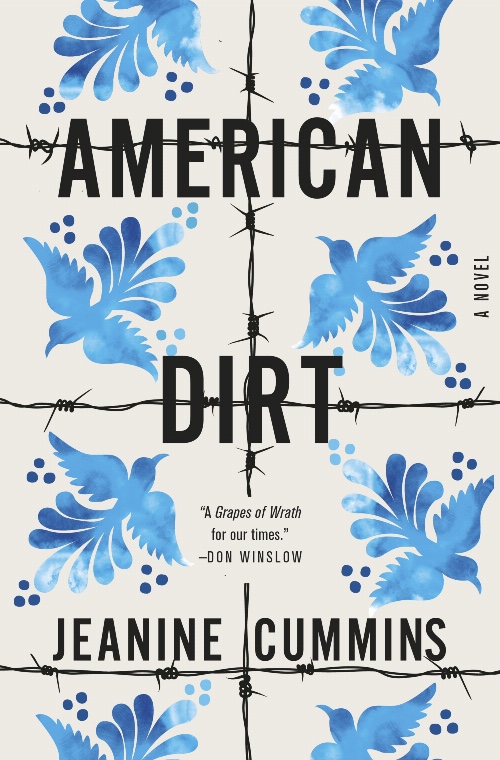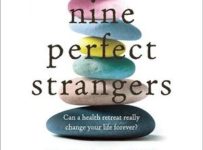
Most anticipated book lists are a way to plan out a month, a season, a year, in reading. American Dirt showed up on so many lists that you think you could trust it. On the day it came out, the day that Oprah lauded it, the internet exploded. American Dirt's author has historically identified as white (as recently as 2015), but has rebranded to vaguely latinx courtesy of her Puerto Rican grandmother. She is described as being married to a formerly undocumented immigrant (undisclosed in the text and promo material: he's from Ireland), and the material is adapted and twisted from material written by people closer to the source.
American Dirt is not a good book, for multiple reasons. It's not #OwnVoices, which is a problem that this reader keeps coming back to (particularly from the cottage industry of gay teen books written by straight white women), but if you can look beyond that (and maybe you can, but take it on board anyway), you should consider its perfunctory nature, its clumsy writing, its irresponsible presentation of Cummins' alleged research, and its carefully manicured apolitical stance that turns out to have a dubious political stance after all.
Lydia is wanted by Javier, the leader of the cartel Los Jardineros, and she believes that he has the entire nation of Mexico in his pocket. After sixteen family members are killed at her niece's quinceañera, Lydia takes the only survivor, her son Luca, and tries to flee to across the United States border with nothing but the clothes on her back and several thousand US dollars.
American Dirt is a tourist's guide to the North American refugee experience. It is designed specifically to temporarily jolt comfortable readers out of their complacency, make them sip their wine, cluck their tongues and talk about “what’s to be done with this border crisis?†Hint: they're not going to do anything. American Dirt, in its misery, is designed to make you feel good: "hey, at least my life's not like thatâ€.
Lydia is designed as "identifiable†to this hypothetical reader: happily middle-class, literate, somehow ignorant of the basic shape of her nation except when Cummins wants to drive home the concept that Mexico is a lawless backwater governed by corruption and blood. Her sole motivation is the protection of her son, Luca, the Rory Calhoun of precocious literary children. Luca is a geography savant, with a built-in natural compass mentioned at the beginning that you had better believe comes into play later in the novel. Cummins is not alone in thinking that a child in a story needs to be exceptional for its life to be worth saving, but it's not appreciated in other books and it's unwelcome here.
These are our two protagonists, and Cummins' perspective tends to shift from mother to son arbitrarily: the immediate aftermath of the massacre is seen through Luca's eyes as he hides with Mami, and Cummins' words serve to infantilise the entire endeavour from the start. Her grasp of child psychology—Luca is very smart, but also intermittently traumatised and rendered mute—is lacking, and shows her lack of trust in her subject. Lydia is your traditional lioness mother type, and that's her entire deal. Her naïveté is unforgivable, given that her husband was a journalist who specifically covered crime, but this is all Cummins gives us to work with. The heart of the book are these two ciphers, and they are as empty as the adventure that embark upon on. At least we know where we are when Cummins follows the mother and son; when she briefly shifts across country to show us what Javier is up to, it is disorienting and poorly integrated.
Cummins cruelly and perfunctorily introduces support characters to act as shields so that Lydia and Luca are spared some suffering: she wants someone raped, but it can't be Lydia; she wants a child to die, but it can't be Luca. Walk-ons come on to the page and suffer, their voices taken from them with their spirits and their lives. Cummins revels in the violences perpetrated against her support cast, the people broken in half, the limbs snapped, the casual sexual abuse. The characters are rag dolls to be tortured, not by an uncaring universe or dark fate, but a sadistic author. It is not illuminating so much as it is exploitative.
Jeanine Cummins' life most emphatically is not reflected between the pages of American Dirt and, while it is ridiculous to suggest that all fiction should be the author's lived experience, when you're writing about something important and pretending it's not political, you have to be at least somewhat true. American Dirt is a shoddily written book that is remarkably dull for the body count it boasts. The thrills emerge from the meta-narrative that dropped the moment the book did. A book's sales—guaranteed in this instance, from the advance publicity, the Oprah endorsement, pull quotes from, among others, Stephen King and Ann Patchett—do not mean that it cannot be challenged or experience pushback. That something receives wider notice actually means that it warrants greater scrutiny than something that no one will read.
Cummins' author's note makes everything infinitely worse. The quote that floats to the surface time and again is that of the "faceless brown mass, clamouring for help at our doorstepâ€. Cummins claims that she aimed to dispel that notion, but she’s just doing her own brand of condescension by projecting that impression upon the white people of the world. The argument for the "humanisation†of the other is a labour that doesn't need to be entered into — it should be a given; Alexander Chee describes it as "dancing for your lifeâ€. Luca and Lydia may need to earn our concern—which, sketchy as they are, they do not—but anyone who needs to learn that Mexicans, Central, and South Americans are human is the one with the problem.
Cummins goes on to say "I wished someone slightly browner than me would write it,†ignoring that her themes and concerns have been articulated at length by a cadre of latinx authors, some of whom she acknowledges within the covers of American Dirt itself. Quality aside, that's the crux of the American Dirt debate: someone with as little credibility as Cummins is getting the publicity and sales that more qualified authors are consistently denied. It's okay, though: this incredibly self-aggrandising author's note says that an academic named Norma Iglesias Prieto (presumably a lovely woman) told her that she had to write it; the discourse does not thank her.
Regardless of where you fall on the matter, American Dirt has been removed from its vacuum. The people taking most exception to the backlash are reactionaries who don't read books but somehow are au fait on publishing controversies—particularly in YA—that, in their eyes, go against such lofty ideals as "freedom of speech†while they ignore the concept of "letting the free market decideâ€. It's an attempt to shift the blame to the responders for making a big deal out of "nothingâ€, and victimising the big publishing house with millions of dollars behind it. Read the reviews either way, but don't read the comments.
Ignore American Dirt‘s #OwnVoices issues at your peril, but you cannot ignore the multiple infractions that Cummins commits against the literary form. Wrongheaded and poorly written, American Dirt is a novel with wafer-thin credentials informed solely by good intentions — the very same material that paves the road to Hell and almost always carries with it the reek of condescension. Jeanine Cummins already has her advance and a place on the New York Times bestseller list, so it doesn't much matter.


